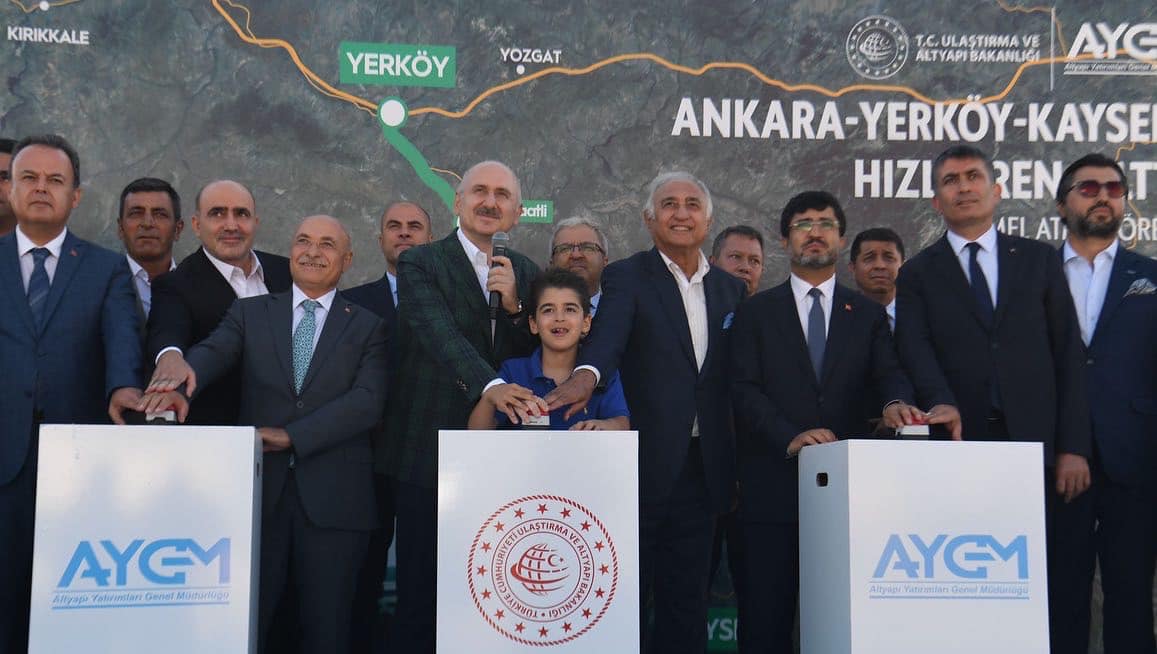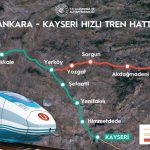 Turkey’s Transport Minister Adil Karaismailoğlu has launched the construction works for the 142 km Yerköy – Kayseri high-speed line in a groundbreaking ceremony held it Kayseri, Central Anatolia. The event was opened by the President Recep Tayyip Erdoğan via a video link.
Turkey’s Transport Minister Adil Karaismailoğlu has launched the construction works for the 142 km Yerköy – Kayseri high-speed line in a groundbreaking ceremony held it Kayseri, Central Anatolia. The event was opened by the President Recep Tayyip Erdoğan via a video link.
The project includes the construction of 15 tunnels totalling 16 km, 118 highway underpasses 18 highway overpasses, 2 bridges and 184 culverts.
“We are building the 142-km-long railway line between Yerköy and Yozgat [in the district of Kayseri] stations and when the line will be completed, it will be integrated with the Ankara – Sivas high-speed railway line. The electrified double-track line will be equipped with the most modern signalling technology to ensure the safety, speeds, control and monitoring of the rail traffic,” the minister said. The new high-speed line is designed to allow speeds of up to 250 km/h.
He pointed out that with the new line, Turkey will have the opportunity to transport 11 million passengers and 650,000 tonnes of cargoes annually between Ankara, Kırıkkale, Yerköy, Şefaatli, Yenifakılı, Himmetdede, Boğazköy and Kayseri stations.
The Yerköy – Kayseri high-speed line will reduce the distance between the two cities by 28 km from 170 km currently on the conventional line to 142 km cutting the travel time by 2 hours from 3 and a half hours to less than 1 hour. In addition, the new line will reduce the journey time between Ankara and Kayseri from 7 hours to 2 hours. In December 2021, the Transport Minister inaugurated an electrified section on the railway line between Ankara and Kayseri allowing electric trains to operate on the entire rail route.
Between completion in 2025 and 2054, the new high-speed line is expected to bring benefits worth EUR 10.5 billion, including EUR 4.1 billion from travel time savings for both passenger and freight transport, EUR 1.4 billion from reduced water, air and noise pollution and EUR 5 billion from reductions in road maintenance costs.
Turkey has started its rail revolution since 2003 when decided to invest in rail modernisation and expansion to ensure a balanced distribution between transportation modes. 2,149 km of railway lines have been built between 2003 and 2020 with an annually average of 134 km. The share of electrified lines increased from 19.4% to 50%, while the installed signalling and telecommunication systems increased from 22% to 53%. It is estimated that EUR 15.7 billion has been invested for rail projects and according to the transport development strategy, EUR 80 billion is the investment plan for the development of rail sector.
The length of Turkey’s rail infrastructure is about 12,800 km comprising 91,194 km of conventional lines and a 1,213 km of high-speed rail system.
The country is currently implementing projects to modernise and renew its railway infrastructure. Currently, the construction works continue on lines totalling 3,872 km, 357 km of which are conventional main lines and 3,515 km of high-speed train lines. In addition, there are plans and ongoing studies for 6,682 km of rail lines.
Share on:






